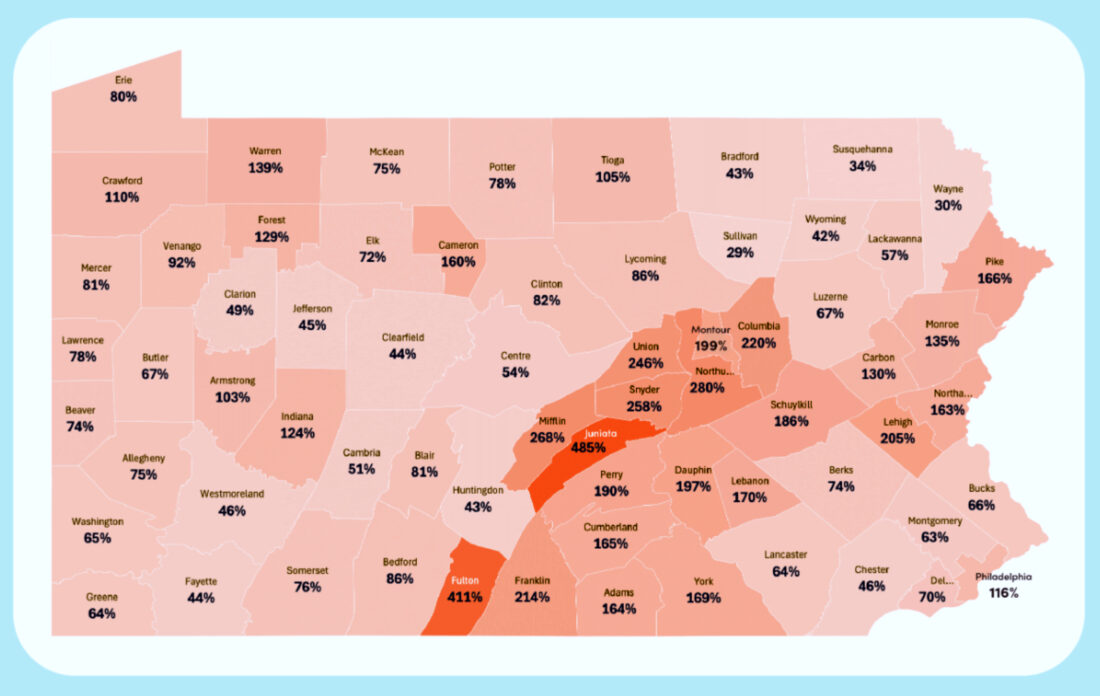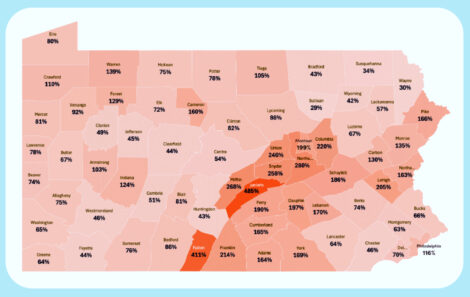Pennsylvanians grapple with surging premiums, expiring subsidies in Pennie Marketplace

Graphic from Pennie A map of projected monthly premium increases for Pennsylvania counties.
At the heart of the longest-ever federal shutdown — now in its sixth week — is whether or not to extend enhanced tax credits for millions of Americans purchasing their plans on Affordable Care Act marketplaces.
Pennie’s open enrollment period for almost 500,000 Pennsylvanians began on Nov. 1, with premiums expected to nearly double or even triple in some cases if those tax credits expire.
Credits are calculated on a sliding scale depending on one’s income and location. They’re designed to make insurance coverage affordable, but come at an annual cost of roughly $1 trillion for the federal government.
“Folks are really panicked,” said Antoinette Kraus, the executive director of Pennsylvania Health Access Network. “They’re trying to figure out, ‘Can I find something that fits within my budget? Do I have to go uninsured?'”
“People are really trying to take a step back and figure out what their options are,” Kraus continued.
Her organization advocates for consumer-based health policy and provides insurance navigation assistance. She said calls have ticked up in recent days. In order to have coverage by Jan. 1, people should enroll by Dec. 15, according to Pennie.
That means potential Pennie enrollees don’t need to sign up today, Kraus emphasized.
“I think our advice to folks is it’s important to come and shop. There’s a bunch of plans available at different levels, so let’s shop around and see if there are options that meet your budget,” Kraus said.
A Pennie release about open enrollment noted several federal changes to the process, including increased penalties for outdated information. For people making roughly $62,600 (or couples making $84,600), there are no longer tax credits available, but those making less may still qualify for smaller benefits.
In October, the Pennsylvania Insurance Department approved rate increases across insurance plans — both those available through Pennie and outside of it. Separately, Pennie estimated that premiums for Pennsylvanians would increase by 102% — which is below the average 114% national increase calculated by KFF.
But some counties will fare better than others. Counties in the northeastern corner, like Sullivan and Wayne, would see monthly increases as low as 29%. Rural central Pennsylvania counties like Fulton and Juniata will have some of the highest monthly increases at 411% and 485%, respectively.
Pennie enrollees are made up of part-time employees, gig workers, farmers, small business owners and others without affordable insurance options. Most use tax credits to lower their monthly premium costs.
The nonpartisan Congressional Budget Office estimated that nearly 4 million more people will eventually be uninsured if the subsidies expire and that extending the enhanced credits would cost an additional $35 billion annually.
Ripple effects
The enhanced premium tax credits are designed so that no enrollee spends more than 8.5% of their income on a health insurance premium. The Philadelphia Inquirer earlier this year calculated that as many as 250,000 Pennsylvanians — half of all Pennie enrollees — could lose their insurance coverage if enhanced tax credits aren’t extended.
Such actions could have a detrimental effect on the state’s health care landscape. If younger, healthier enrollees pull out of the system, for example, premiums will increase for the remaining members who are disproportionately older and sicker than the general population.
“Our biggest concern is people are just going to go without coverage, which pushes up the uninsured rate, which impacts us all — whether we’re on Pennie or not,” Kraus said. “People who don’t get care for small things, it turns into larger things and they end up in the emergency room. So your wait time could be longer because there could be more folks in the emergency room.”
Uncompensated care costs, or health care services devoted to those without payment, could also increase, eating into the bottom line of thinly stretched rural hospitals and providers.
Additionally, some scammers have websites designed to look like legitimate online insurance marketplaces in an attempt to collect personal information and payments. Some call or email for special rates and time sensitive pitches.
Even if they offer plans, they might not meet federal minimums or provide “adequate coverage,” warns state Attorney General Dave Sunday.
“Scammers today try to attach their scams to trending events and happenings, making them more believable and increasing their chances of success,” Sunday said in a release. “If you are using the marketplace to shop for a new health insurance plan this year, be sure you are practicing due diligence. Do not let scammers prevent you from accessing necessary medical care.”
Pennie is the state’s only marketplace and has resources for those seeking localized or in-person guidance.
Pa’s congressional
delegation
The commonwealth’s 17 members of the U.S. House split on partisan lines when it came to voting on a continuing resolution to fund the federal government, with all seven Democrats against and Republicans supporting the measure.
Tax credits aren’t due to expire until the end of the year and the continuing resolution currently under consideration would only fund services through Nov. 21 without explicitly impacting those benefits. But Democrats want an extension before signing onto any spending agreement.
Several Democrats pinned projected increases on Republicans and vowed to withhold their support unless tax credits were extended.
“Today, millions of Americans are being forced to make impossible choices because of the Republican health care crisis,” wrote Rep. Brendan Boyle, (D-2nd District), on Nov. 1. “Families across the country will pay double or triple what they did before — or lose their coverage altogether.”
Pennsylvania U.S. Sen. John Fetterman, also a Democrat, broke with his party to vote in favor of a funding deal that didn’t include an extension.
“I’m the guy that’s going to consistently vote for country over party,” he said in a one-minute video statement earlier this month, citing priorities like military pay and food benefits. “… and I’m also going to fight for the same 420,000 Pennsylvanians that depend on those tax credits to make health insurance more affordable.
“Two things are true and we can fight for all of them as long as our government is open,” he added.
Some House Republicans have taken a similar stance, including three Pennsylvania representatives who signed onto a letter urging U.S. House Speaker Mike Johnson to revisit the subsidies once a funding agreement is reached.
Three of Pennsylvania’s 10 House Republicans signed the letter, including Rep. Rob Bresnahan, Jr. (8th District). Bresnahan told the Capital-Star he supported an extension, and emphasized the need to reopen the government before negotiations could begin.
“I am proud to be an original cosponsor of legislation to extend the ACA tax credits. I remain committed to working across the aisle to find a solution, but I refuse to hold our troops and federal workers and their pay hostage to do so. As my colleagues and I said in our letter, ‘using the shutdown as leverage to force debate only prolongs the harm and distracts from the immediate task of reopening the government.’ I look forward to working on a solution to these tax credits with Speaker Johnson as soon as the government reopens,” he said.
Other Republicans have pushed for a one-year or two-year extension of the tax credits. As of Wednesday, negotiations still appeared to be at an impasse.
However, Pennie Executive Director Devon Trolley told WESA last week that any congressional action in November wouldn’t be immediate, urging patience for those navigating the system. He said it may take a week or two before Pennie can incorporate any changes.
Kraus advised participants to monitor their mail, email and trusted sources in the coming weeks for more news.
“We don’t know what Congress is going to do. Hopefully, they take action. But, if they take action in the coming weeks or months, that could change what you’re eligible for,” advised Kraus. “Really, watch your mail, your email in case something changes.”
——
Pennsylvania Capital-Star is part of States Newsroom, a network of news bureaus supported by grants and a coalition of donors as a 501c(3) public charity. Pennsylvania Capital-Star maintains editorial independence. Contact Editor Tim Lambert for questions: info@penncapital-star.com. Follow Pennsylvania Capital-Star on Facebook and Twitter.


